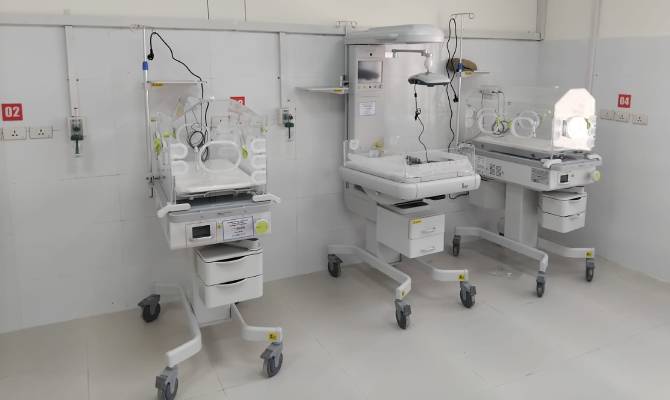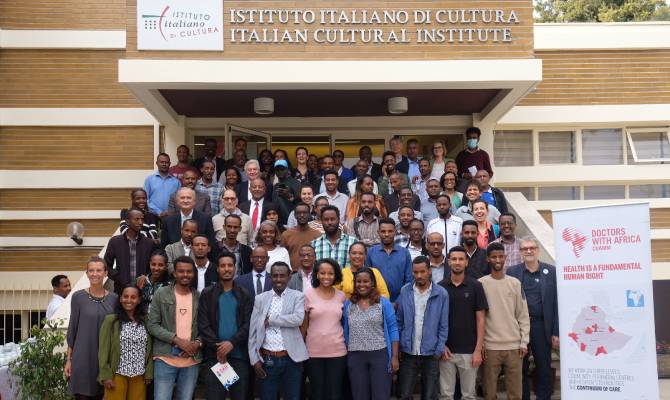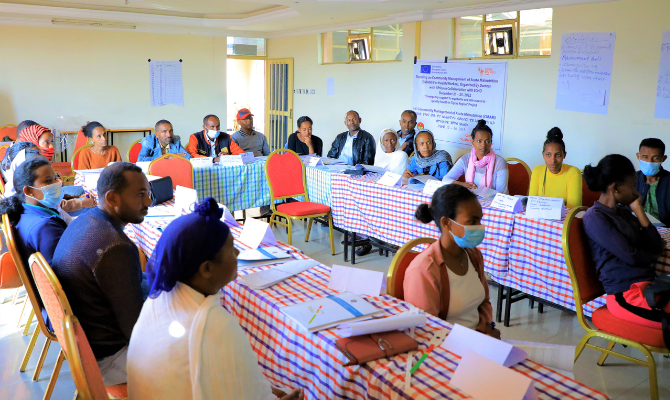A completely renovated neonatal unit — with new spaces and equipment — now offers safe, high-quality care to the smallest patients in Tigray, a region severely affected by years of conflict.
The new ward was inaugurated last week at Suhul Hospital in Shire, in the presence of representatives from the Tigray Regional Health Bureau (RHB), UN agencies, local and municipal authorities, partner organizations, and the hospital team.
Today, Suhul Hospital looks very different: a modern, fully equipped neonatal intensive care unit ensures life-saving treatment for premature and critically ill newborns. The refurbished spaces also provide a safer, cleaner, and more efficient working environment for doctors and nurses.
“I’m very excited to be part of this inauguration,” said Mr. Ermias Guash, CEO of the General Hospital. “We are honored to have been provided with a fully renovated and modern facility that will help address the root causes of neonatal health service challenges and ensure the availability of essential medical equipment. CUAMM’s support goes far beyond supplying medicines and materials—it has truly transformed our capacity to care for patients.”
This important achievement was made possible thanks to the collaboration with the Tigray Health Bureau and local health authorities, and with the financial support of the Italian Cooperation. The initiative contributes to the Sustainable Development Goals, particularly the improvement of maternal and child health, which Ethiopia is pursuing through the strengthening and expansion of health services even in remote and crisis-affected areas.
“CUAMM has been deeply committed to supporting healthcare in Ethiopia, particularly here in the Tigray region, in Shire and its surrounding areas,” said Riccardo Lazzaro – Doctors with Africa CUAMM Health Coordinator. “Through the Strengthening Neonatology in Ethiopia project, we have contributed over 29 million birr to enhance the neonatal intensive care unit of this hospital. Our support will continue as we work to complete the ongoing projects at Suhul and Indabaguna hospitals.”
The challenges remain immense. During the two-year conflict, which ended only in November 2022, most health facilities in Tigray were looted, vandalized, or destroyed, and healthcare services severely weakened by the loss of personnel and resources.
The city of Shire, in the North Western Zone, was among the hardest hit. Today, only one in three hospitals in the area is fully operational. Suhul Hospital serves as a vital referral center for more than two million people, in a zone that also hosts around 400,000 internally displaced families (IOM, June 2023).
“Suhul Hospital is the region’s second-largest in both services and staff. I encourage all partners to sustain this collaboration to advance healthcare quality and the well-being of our people.” Said Dr. Simon Gebretsadik – Deputy Head of Tigray Regional Health Bureau during the ceremony.

The renovated Nicu at Suhul Hospital equipped with a wall-mounted oxygen system.
Among the most requested services are maternal and newborn care. Every day, the hospital registers an average of 17–20 deliveries, including about three cesarean sections. Ensuring quality care is therefore essential to reduce neonatal and infant mortality.
Thanks to the renovated neonatal unit, the hospital can now care for babies born after 32 weeks of gestation and weighing more than 1.5 kg, in line with the national health guidelines.
“Thanks to this intervention, the hospital has improved its procedures, expanded access to care, and can now provide modern, high-quality services” stated Dr. Tewelede Gebre Selasie, Director of Suhul Hospital.
During the inauguration ceremony, the Mayor of Shire also expressed their gratitude to civil society, the hospital’s dedicated staff, and all the healthcare workers who have continued to serve their communities despite the difficult circumstances.
The renovation of the neonatal unit marks the first major rehabilitation at Suhul Hospital under the ongoing health system strengthening program — a crucial step forward to improve health infrastructure in the region, strengthen maternal and child health services, and ensure accessible, dignified care for all.





